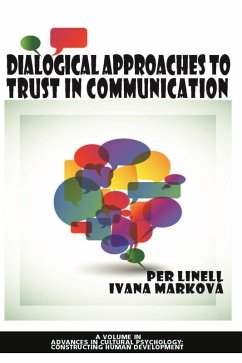Psycho-Criminological Approaches to Stalking Behavior (eBook, ePUB)
An International Perspective


Alle Infos zum eBook verschenken

Psycho-Criminological Approaches to Stalking Behavior (eBook, ePUB)
An International Perspective
- Format: ePub
- Merkliste
- Auf die Merkliste
- Bewerten Bewerten
- Teilen
- Produkt teilen
- Produkterinnerung
- Produkterinnerung

Hier können Sie sich einloggen

Bitte loggen Sie sich zunächst in Ihr Kundenkonto ein oder registrieren Sie sich bei bücher.de, um das eBook-Abo tolino select nutzen zu können.
Provides multidisciplinary coverage of stalking behavior worldwide from both academic and practical approaches
Psycho-Criminological Approaches to Stalking Behavior: The International Perspective is a thorough, up-to-date overview of stalking perpetration and victimization in different regions of the world. This authoritative book brings together contributions from a team of leading scholars and practitioners that discuss a diverse range of interrelated topics and issues relevant to stalking and intrusive behavior from both theoretical and practical contexts. Whereas most of the literature…mehr
- Geräte: eReader
- ohne Kopierschutz
- eBook Hilfe
![Treating Stalking (eBook, ePUB) Treating Stalking (eBook, ePUB)]() Troy McEwanTreating Stalking (eBook, ePUB)40,99 €
Troy McEwanTreating Stalking (eBook, ePUB)40,99 €![Dialogical Approaches to Trust in Communication (eBook, ePUB) Dialogical Approaches to Trust in Communication (eBook, ePUB)]() Dialogical Approaches to Trust in Communication (eBook, ePUB)41,95 €
Dialogical Approaches to Trust in Communication (eBook, ePUB)41,95 €![The Wiley International Handbook of Correctional Psychology (eBook, ePUB) The Wiley International Handbook of Correctional Psychology (eBook, ePUB)]() The Wiley International Handbook of Correctional Psychology (eBook, ePUB)267,99 €
The Wiley International Handbook of Correctional Psychology (eBook, ePUB)267,99 €![Adult Deliberate Firesetting (eBook, ePUB) Adult Deliberate Firesetting (eBook, ePUB)]() Theresa A. GannonAdult Deliberate Firesetting (eBook, ePUB)44,99 €
Theresa A. GannonAdult Deliberate Firesetting (eBook, ePUB)44,99 €![The Wiley Handbook of What Works in Child Maltreatment (eBook, ePUB) The Wiley Handbook of What Works in Child Maltreatment (eBook, ePUB)]() The Wiley Handbook of What Works in Child Maltreatment (eBook, ePUB)43,99 €
The Wiley Handbook of What Works in Child Maltreatment (eBook, ePUB)43,99 €![We (eBook, ePUB) We (eBook, ePUB)]() Robert A. JohnsonWe (eBook, ePUB)8,99 €
Robert A. JohnsonWe (eBook, ePUB)8,99 €![About Behaviorism (eBook, ePUB) About Behaviorism (eBook, ePUB)]() B. F. SkinnerAbout Behaviorism (eBook, ePUB)5,99 €
B. F. SkinnerAbout Behaviorism (eBook, ePUB)5,99 €-
-
-
Psycho-Criminological Approaches to Stalking Behavior: The International Perspective is a thorough, up-to-date overview of stalking perpetration and victimization in different regions of the world. This authoritative book brings together contributions from a team of leading scholars and practitioners that discuss a diverse range of interrelated topics and issues relevant to stalking and intrusive behavior from both theoretical and practical contexts. Whereas most of the literature on the subject is written from a Western viewpoint, this unique volume examines empirical research, policies, and practices from Asian and African countries, as well as those from Europe, the Americas, and Australia, to provide a truly global perspective.
Divided into three parts, the book first examines theories and research on cross-national differences in stalking among college students, ex-partner stalking in Finland, cyberstalking victimization in Singapore, the heterogeneity of stalking and stalkers in Australia, public familiarity and understanding of stalking/harassing legislation in Australia, the United Kingdom, and the United States, and more. The book's second part focuses on national portraits of stalking in a number of understudied populations, including Lithuania, Spain, Denmark, Portugal, and South Africa. Finally in the third section of the book, the chapters largely emphasize policy and best practice, including the Dutch model of policing stalking, risk assessment and management of stalking in Sweden, psycho-legal responses to online interpersonal harm, the German approach to stopping stalking, the United Kingdom response to assessing and managing stalking, and the work of the Danish Stalking Centre. This important contribution to the field:
- Offers insights from international professionals applicable in other geographical contexts
- Discusses the factors that influence social awareness and responses to stalking
- Explores the importance of victim vulnerability factors when managing risk of stalking
- Presents real-world case studies of stalking behavior, intimate partner violence, stalking victimization, and statutory and law enforcement efforts
- Reviews the intervention practices of the support institutions and justice systems of different countries
Psycho-Criminological Approaches to Stalking Behavior: The International Perspective is an ideal primary or supplementary text for courses in criminology, criminal justice, forensic psychology, and social and behavioral science, as well as a valuable source of reference for those who deal with offenders or victims of stalking, including law enforcement agents, mental health professionals, legal practitioners, social services personnel, and policy makers.
Dieser Download kann aus rechtlichen Gründen nur mit Rechnungsadresse in D ausgeliefert werden.
- Produktdetails
- Verlag: John Wiley & Sons
- Erscheinungstermin: 26. März 2020
- Englisch
- ISBN-13: 9781119565475
- Artikelnr.: 59167489
- Verlag: John Wiley & Sons
- Erscheinungstermin: 26. März 2020
- Englisch
- ISBN-13: 9781119565475
- Artikelnr.: 59167489
- Herstellerkennzeichnung Die Herstellerinformationen sind derzeit nicht verfügbar.
Lorraine Sheridan, PhD is a Chartered Forensic Psychologist and Associate Professor at Curtin University, Australia. The author of four books and numerous papers, she trains professionals involved in investigating stalking crimes and provides case management advice to police, security personnel, public figures, and others on stalking, harassment, violence, and risk and threat assessment.
Criminological Perspective 6 References 7 Part I: Theories and Research 9 1 Stalking and Cyberstalking Victimization Research: Taking Stock of Key Conceptual, Definitional, Prevalence, and Theoretical Issues 11 Erica R. Fissel, Bradford W. Reyns, and Bonnie S. Fisher Introduction 11 Conceptual and Definitional Issues-Stalking 13 Conceptual and Definitional Issues-Cyberstalking 15 Prevalence of Stalking and Cyberstalking Victimization 16 Theoretical Approaches Applied to Stalking and Cyberstalking Victimization 22 Multi
Theoretical Frameworks 30 Future Directions for Research 31 References 32 2 Racial Differences in Stalking Victimization, Police Reporting, and Coping Strategies among White, Black, and Asian Americans 37 Fawn T. Ngo Introduction 37 Stalking Victimization 39 Racial Differences in Stalking Victimization 40 Racial Differences in Help
Seeking Behaviors Among Stalking Victims 41 Data and Methods 42 Sample 42 Measures 44 Analytic Strategy 46 Results 46 Discussion and Conclusion 47 References 51 3 Ex
Partner Stalking in Finland: Children as Knowing Agents in Parental Stalking 55 Merja Laitinen and Anna Nikupeteri Introduction 55 Finland as a Research Context for Ex
Partner Stalking 57 Method 58 Dimensions of Children's Knowing Agency 60 Children's Various Knowing Agency 71 Conclusion 73 Acknowledgments 74 References 74 4 Unwanted Attention: A Survey on Cyberstalking Victimization 77 Majeed Khader and Stephanie Chan Introduction 77 Characteristics of Cyberspace 78 Defining Cyberstalking 79 Reviewing the Literature on Cyberstalking 79 Impact of Cyberstalking on Victims 80 Victims' Actions and Coping Efforts 81 Recent Developments in the Cyberstalking Landscape in Singapore 81 Three Surveys of Cyberstalking in Emergent Adults in Singapore 82 Methodology 83 General Discussion on Three Singapore Surveys 100 Study Limitations 102 Conclusion 102 Acknowledgments 103 References 103 Examples of Cyberstalking 108 Survey Questionnaire 109 5 Is there a "Best" Stalking Typology?: Parsing the Heterogeneity of Stalking and Stalkers in an Australian Sample 115 Troy E. McEwan and Michael R. Davis Introduction 115 Offense and Offender Classification Schemes 116 A Brief History of Stalking Classification Schemes 117 Which Typology to Use? 122 Aim and Approach of the Current Study 123 Method 123 Results 125 Discussion 128 Support for each of the Commonly Used Stalking Typologies 129 Choosing which Typology to Use 132 Conclusion 133 Acknowledgment 133 References 134 6 Public Familiarity and Understanding of Stalking/Harassment Legislation in Australia, the United Kingdom, and the United States 137 Adrian J. Scott, Nikki Rajakaruna, Megan A. Handscomb, and Georgina A. H. Waterworth Introduction 137 Method 141 Findings 144 Discussion 151 References 155 Part II: National Portraits 159 7 Stalking Perception, Victimization, and Anti
Stalking Response in the Lithuanian Context 161 Ilona Laurinaityt
and Ilona Michailovi
Introduction 161 Issues of Stalking Definition 162 Prevalence of Stalking 164 Stalking and Gender
Based Stereotypes 168 Stalking: Legal Protection and Prevention 170 Conclusions 171 References 172 8 Stalking and Intimate Partner Violence Prevention from Ecological and Public Health Perspectives: The Spanish Experience 175 Montse SubiranäMalaret, Ana Martinez Catena, and Jacqueline Gahagan An Introduction to Intimate Partner Violence 175 The Criminalization of Stalking in the Context of Intimate Partner Violence (IPV) in Spain 177 The Evolution of Social Perceptions of IPV in Spain and its Legislation 179 Quantifying IPV in Spain: An Overview of Available Data 181 Inclusion of Stalking in Crimes against Freedom in the Spanish Penal Code 185 Latest Measures against IPV in Spain and the Repercussions Emerging from the Most Recent Social Movements 187 Violence Prevention in the Context of Ecological and Public Health Approaches 189 References 190 9 Stalking as a Phenomenon in a Danish Context 195 Lise Linn Larsen, Dianna Bomholt, and Helle Hundahl Introduction 195 Danish Stalking Centre 197 Stalking as a Phenomenon 197 Stalking as Violence 199 Stalking as a Social Problem 204 References 207 10 Stalking in Portugal: From Numbers to the New Challenges 209 Celia Ferreira and Marlene Matos Introduction 209 The Experience of Fear 210 The Situation in Portugal 211 Criminal Statistics 218 Difficulties and Post
Criminalization Challenges 221 References 223 11 Stalking in South Africa 227 Gerard Labuschagne and Bronwynn Stollarz Introduction 227 Stalking in a Multicultural Society 228 Legal Aspects in South Africa 230 Case Example: State vs. Walabh 236 Case Example: Intimate Partner Stalker 238 Case Example: Workplace Stalking in the Mental Health Care Environment 240 Conclusion 241 References 241 Part III: Policy and Best Practice 245 12 The Dutch Model: A New Approach to Policing Stalking 247 Cleo Brandt and Bianca Voerman The Challenges of Defining Stalking from a Dutch Perspective 247 The Potential Consequences of "Missing" Stalking 249 Key Problems Leading to Inadequate Response by Dutch Police 252 Developing a More Effective Response to Stalking 259 A Structured Police Approach to Stalking 259 Conclusion 265 References 266 13 Risk Assessment and Management of Stalking in Sweden: The Importance of Fear as a Victim Vulnerability Factor 269 Susanne Strand Introduction 269 Prevalence of Stalking Victimization 271 Fear as a Victim Vulnerability Factor 272 Stalking Victimization 274 Policing Stalking 276 Risk Assessment and Risk Management of Stalking 278 Collaboration for Better Protection of Victims 281 Conclusion 282 References 283 14 Hashtag You're It: Limitations of Psycho
Legal Responses to Online Interpersonal Harm 287 Luke Bartlett and Annabel Chan Lawful Good: A Proposed Framework for Sentencing Online Harmful Behaviors 287 Old DOS, New Tricks 290 Zeroes Versus One: How People Behave Badly Online 290 Mass Effect: When People Behave Badly Together Online 291 Invisible and Indivisible: Why People Behave Badly Online 293 If a Tree Falls in Cyberspace: Accountability for Online Harm 294 Murder, She Posted: Legality of Online Threats 296 Fuzzy Logic: Analysis of Psychological Assumptions Made in Cyberthreat Law 297 Capacity to Assess for Intent, and Estimation of Probable Fear 298 Online Threats, Offline Harm 301 To Kill a Mocking Tweet 304 References 305 15 Stop Stalking-But How? 309 Olga Siepelmeyer and Wolf Ortiz
Muller Introduction 309 Offer and Access 310 The Rationale of Counseling-Integration of Methods 312 Validate to Change-The Dialectic between Process and Confrontation 315 Tell Me Why-Formulation as the Case Conceptualization 317 Give Me a Point-Strengthening the Healthy Adult 320 Stop It! Limiting the Problem Behavior 321 To Change or Not to Change? Motivational Issues 322 What Comes when Stalking Goes? Working with Pathological Grief 326 Does it Really Work? Results of a Retrospective Survey 327 Conclusions 329 References 329 16 National Stalking Clinic: A UK Response to Assessing and Managing Stalking Behavior 335 Sara Henley, Alan Underwood, and Frank Farnham Introduction 335 Legal Changes 336 Theoretical Approach 337 Setting up the Clinic 338 Descriptive Analysis of the First 60 Cases 341 Case Examples 343 Summary and Conclusions 349 References 350 17 The Danish Stalking Centre, 2019 351 Lise Linn Larsen, Dianna Bomholt, and Helle Hundahl Introduction 351 Target Group for the Intervention Center 352 The Conceptual Framework of the Intervention and its Perspective 352 Helpline 354 Referral for Professional Multidisciplinary Interventions 356 Professional Multidisciplinary Services 359 Psychotherapy at the Danish Stalking Centre 360 Psychotherapy for Stalking Victims 361 Intervention for Children and Families of Stalking Victims 365 Psychotherapy for Stalkers 366 Knowledge of the Target Group and Effect 370 Knowledge Center 372 Cooperation Across Authorities and Sectors 374 Future Goals for Danish Stalking Centre 379 References 379 Conclusions 381 Lorraine Sheridan and Heng Choon (Oliver) Chan Concluding Remarks 381 Author Index 387 Subject Index 393
Criminological Perspective 6 References 7 Part I: Theories and Research 9 1 Stalking and Cyberstalking Victimization Research: Taking Stock of Key Conceptual, Definitional, Prevalence, and Theoretical Issues 11 Erica R. Fissel, Bradford W. Reyns, and Bonnie S. Fisher Introduction 11 Conceptual and Definitional Issues-Stalking 13 Conceptual and Definitional Issues-Cyberstalking 15 Prevalence of Stalking and Cyberstalking Victimization 16 Theoretical Approaches Applied to Stalking and Cyberstalking Victimization 22 Multi
Theoretical Frameworks 30 Future Directions for Research 31 References 32 2 Racial Differences in Stalking Victimization, Police Reporting, and Coping Strategies among White, Black, and Asian Americans 37 Fawn T. Ngo Introduction 37 Stalking Victimization 39 Racial Differences in Stalking Victimization 40 Racial Differences in Help
Seeking Behaviors Among Stalking Victims 41 Data and Methods 42 Sample 42 Measures 44 Analytic Strategy 46 Results 46 Discussion and Conclusion 47 References 51 3 Ex
Partner Stalking in Finland: Children as Knowing Agents in Parental Stalking 55 Merja Laitinen and Anna Nikupeteri Introduction 55 Finland as a Research Context for Ex
Partner Stalking 57 Method 58 Dimensions of Children's Knowing Agency 60 Children's Various Knowing Agency 71 Conclusion 73 Acknowledgments 74 References 74 4 Unwanted Attention: A Survey on Cyberstalking Victimization 77 Majeed Khader and Stephanie Chan Introduction 77 Characteristics of Cyberspace 78 Defining Cyberstalking 79 Reviewing the Literature on Cyberstalking 79 Impact of Cyberstalking on Victims 80 Victims' Actions and Coping Efforts 81 Recent Developments in the Cyberstalking Landscape in Singapore 81 Three Surveys of Cyberstalking in Emergent Adults in Singapore 82 Methodology 83 General Discussion on Three Singapore Surveys 100 Study Limitations 102 Conclusion 102 Acknowledgments 103 References 103 Examples of Cyberstalking 108 Survey Questionnaire 109 5 Is there a "Best" Stalking Typology?: Parsing the Heterogeneity of Stalking and Stalkers in an Australian Sample 115 Troy E. McEwan and Michael R. Davis Introduction 115 Offense and Offender Classification Schemes 116 A Brief History of Stalking Classification Schemes 117 Which Typology to Use? 122 Aim and Approach of the Current Study 123 Method 123 Results 125 Discussion 128 Support for each of the Commonly Used Stalking Typologies 129 Choosing which Typology to Use 132 Conclusion 133 Acknowledgment 133 References 134 6 Public Familiarity and Understanding of Stalking/Harassment Legislation in Australia, the United Kingdom, and the United States 137 Adrian J. Scott, Nikki Rajakaruna, Megan A. Handscomb, and Georgina A. H. Waterworth Introduction 137 Method 141 Findings 144 Discussion 151 References 155 Part II: National Portraits 159 7 Stalking Perception, Victimization, and Anti
Stalking Response in the Lithuanian Context 161 Ilona Laurinaityt
and Ilona Michailovi
Introduction 161 Issues of Stalking Definition 162 Prevalence of Stalking 164 Stalking and Gender
Based Stereotypes 168 Stalking: Legal Protection and Prevention 170 Conclusions 171 References 172 8 Stalking and Intimate Partner Violence Prevention from Ecological and Public Health Perspectives: The Spanish Experience 175 Montse SubiranäMalaret, Ana Martinez Catena, and Jacqueline Gahagan An Introduction to Intimate Partner Violence 175 The Criminalization of Stalking in the Context of Intimate Partner Violence (IPV) in Spain 177 The Evolution of Social Perceptions of IPV in Spain and its Legislation 179 Quantifying IPV in Spain: An Overview of Available Data 181 Inclusion of Stalking in Crimes against Freedom in the Spanish Penal Code 185 Latest Measures against IPV in Spain and the Repercussions Emerging from the Most Recent Social Movements 187 Violence Prevention in the Context of Ecological and Public Health Approaches 189 References 190 9 Stalking as a Phenomenon in a Danish Context 195 Lise Linn Larsen, Dianna Bomholt, and Helle Hundahl Introduction 195 Danish Stalking Centre 197 Stalking as a Phenomenon 197 Stalking as Violence 199 Stalking as a Social Problem 204 References 207 10 Stalking in Portugal: From Numbers to the New Challenges 209 Celia Ferreira and Marlene Matos Introduction 209 The Experience of Fear 210 The Situation in Portugal 211 Criminal Statistics 218 Difficulties and Post
Criminalization Challenges 221 References 223 11 Stalking in South Africa 227 Gerard Labuschagne and Bronwynn Stollarz Introduction 227 Stalking in a Multicultural Society 228 Legal Aspects in South Africa 230 Case Example: State vs. Walabh 236 Case Example: Intimate Partner Stalker 238 Case Example: Workplace Stalking in the Mental Health Care Environment 240 Conclusion 241 References 241 Part III: Policy and Best Practice 245 12 The Dutch Model: A New Approach to Policing Stalking 247 Cleo Brandt and Bianca Voerman The Challenges of Defining Stalking from a Dutch Perspective 247 The Potential Consequences of "Missing" Stalking 249 Key Problems Leading to Inadequate Response by Dutch Police 252 Developing a More Effective Response to Stalking 259 A Structured Police Approach to Stalking 259 Conclusion 265 References 266 13 Risk Assessment and Management of Stalking in Sweden: The Importance of Fear as a Victim Vulnerability Factor 269 Susanne Strand Introduction 269 Prevalence of Stalking Victimization 271 Fear as a Victim Vulnerability Factor 272 Stalking Victimization 274 Policing Stalking 276 Risk Assessment and Risk Management of Stalking 278 Collaboration for Better Protection of Victims 281 Conclusion 282 References 283 14 Hashtag You're It: Limitations of Psycho
Legal Responses to Online Interpersonal Harm 287 Luke Bartlett and Annabel Chan Lawful Good: A Proposed Framework for Sentencing Online Harmful Behaviors 287 Old DOS, New Tricks 290 Zeroes Versus One: How People Behave Badly Online 290 Mass Effect: When People Behave Badly Together Online 291 Invisible and Indivisible: Why People Behave Badly Online 293 If a Tree Falls in Cyberspace: Accountability for Online Harm 294 Murder, She Posted: Legality of Online Threats 296 Fuzzy Logic: Analysis of Psychological Assumptions Made in Cyberthreat Law 297 Capacity to Assess for Intent, and Estimation of Probable Fear 298 Online Threats, Offline Harm 301 To Kill a Mocking Tweet 304 References 305 15 Stop Stalking-But How? 309 Olga Siepelmeyer and Wolf Ortiz
Muller Introduction 309 Offer and Access 310 The Rationale of Counseling-Integration of Methods 312 Validate to Change-The Dialectic between Process and Confrontation 315 Tell Me Why-Formulation as the Case Conceptualization 317 Give Me a Point-Strengthening the Healthy Adult 320 Stop It! Limiting the Problem Behavior 321 To Change or Not to Change? Motivational Issues 322 What Comes when Stalking Goes? Working with Pathological Grief 326 Does it Really Work? Results of a Retrospective Survey 327 Conclusions 329 References 329 16 National Stalking Clinic: A UK Response to Assessing and Managing Stalking Behavior 335 Sara Henley, Alan Underwood, and Frank Farnham Introduction 335 Legal Changes 336 Theoretical Approach 337 Setting up the Clinic 338 Descriptive Analysis of the First 60 Cases 341 Case Examples 343 Summary and Conclusions 349 References 350 17 The Danish Stalking Centre, 2019 351 Lise Linn Larsen, Dianna Bomholt, and Helle Hundahl Introduction 351 Target Group for the Intervention Center 352 The Conceptual Framework of the Intervention and its Perspective 352 Helpline 354 Referral for Professional Multidisciplinary Interventions 356 Professional Multidisciplinary Services 359 Psychotherapy at the Danish Stalking Centre 360 Psychotherapy for Stalking Victims 361 Intervention for Children and Families of Stalking Victims 365 Psychotherapy for Stalkers 366 Knowledge of the Target Group and Effect 370 Knowledge Center 372 Cooperation Across Authorities and Sectors 374 Future Goals for Danish Stalking Centre 379 References 379 Conclusions 381 Lorraine Sheridan and Heng Choon (Oliver) Chan Concluding Remarks 381 Author Index 387 Subject Index 393







